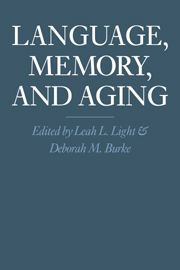Book contents
- Frontmatter
- Contents
- List of contributors
- Preface
- 1 Theories of information processing and theories of aging
- 2 Effects of aging on verbal abilities: Examination of the psychometric literature
- 3 Aging and individual differences in memory for written discourse
- 4 Geriatric psycholinguistics: Syntactic limitations of oral and written language
- 5 Aging and memory activation: The priming of semantic and episodic memories
- 6 Automatic and effortful semantic processes in old age: Experimental and naturalistic approaches
- 7 Integrating information from discourse: Do older adults show deficits?
- 8 Comprehension of pragmatic implications in young and older adults
- 9 Capacity theory and the processing of inferences
- 10 Age differences in memory for texts: Production deficiency or processing limitations?
- 11 Episodic memory and knowledge interactions across adulthood
- 12 The disorder of naming in Alzheimer's disease
- 13 Language and memory processing in senile dementia Alzheimer's type
- 14 Patterns of language and memory in old age
- Author index
- Subject index
11 - Episodic memory and knowledge interactions across adulthood
Published online by Cambridge University Press: 05 January 2012
- Frontmatter
- Contents
- List of contributors
- Preface
- 1 Theories of information processing and theories of aging
- 2 Effects of aging on verbal abilities: Examination of the psychometric literature
- 3 Aging and individual differences in memory for written discourse
- 4 Geriatric psycholinguistics: Syntactic limitations of oral and written language
- 5 Aging and memory activation: The priming of semantic and episodic memories
- 6 Automatic and effortful semantic processes in old age: Experimental and naturalistic approaches
- 7 Integrating information from discourse: Do older adults show deficits?
- 8 Comprehension of pragmatic implications in young and older adults
- 9 Capacity theory and the processing of inferences
- 10 Age differences in memory for texts: Production deficiency or processing limitations?
- 11 Episodic memory and knowledge interactions across adulthood
- 12 The disorder of naming in Alzheimer's disease
- 13 Language and memory processing in senile dementia Alzheimer's type
- 14 Patterns of language and memory in old age
- Author index
- Subject index
Summary
In this chapter we explore possible adulthood changes in the contributions of knowledge to acquisition of new information into memory (episodic memory). In particular, we are interested in the ways that prior knowledge may compensate for a loss of processing resources associated with increasing age. We begin with the assumption that there is a decline in the efficiency of cognitive resources with increasing age. Although this assumption is not universally accepted, there is much evidence of age deficits on tasks varying in range of complexity from simple reaction time (see Salthouse, 1985a) to complex problem solving (e.g., Denney, 1982). In the area of memory, recent research has been directed at characterizing these declines. Alternatives commonly discussed include a loss of processing speed (Salthouse, 1985b), reduction in attentional resources (Craik & Byrd, 1982), deficit in retrieval (Burke & Light, 1981), and reductions in information-processing capacity (Hasher & Zacks, 1979).
In this chapter we describe memory tasks in which age deficits are commonly observed and discuss when and how prior knowledge seems to compensate at least partially for loss of processing resources. We suggest that equalization of prior knowledge of materials tends to ameliorate, but not eliminate, age differences in memory performance. We attempt to specify when variables related to knowledge would or would not be expected to reduce age differences. The review does not cover all aspects of memory. Instead, it focuses on episodic memory.
Information
- Type
- Chapter
- Information
- Language, Memory, and Aging , pp. 191 - 208Publisher: Cambridge University PressPrint publication year: 1988
Accessibility standard: Unknown
Why this information is here
This section outlines the accessibility features of this content - including support for screen readers, full keyboard navigation and high-contrast display options. This may not be relevant for you.Accessibility Information
- 2
- Cited by
